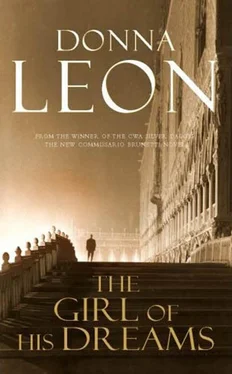'Tell me again exactly what you said to him’ Paola asked but then interrupted herself, holding up her glass: 'You think he makes this himself?'
'I've no idea’ Brunetti admitted. 'But it's certainly better than anything I've ever bought that had a tax stamp on it.'
'Pity, then’ Paola said.
'Pity what?'
'That he doesn't make it legally'
'So he could make more of it?' Brunetti asked, really not understanding.
'Something like that, I suppose’ Paola said. 'Or that we could buy it openly and eliminate your sense that you owe him a favour every time he gives it to you.'
'He's been paid enough’ Brunetti said, giving no explanation of what that might mean. 'Besides, you know how hard it is to open a business, especially one where he'd have to get the licences to produce alcohol. No, he's better doing it the way he does.'
'Protected by the police?' she asked, using the vocal equivalent of a poke with a stick.
'And the Guardia di Finanza’ Brunetti added complacently. 'Don't forget them.'
She emptied her glass, set it on the table, and said, this time employing the voice she used when she had been bested, 'All right. But going back to this Gypsy, tell me again exactly what you said to him.'
Brunetti cradled the small glass between his hands. 'That she had a disease when she died. Which is true enough’ he added, realizing that it was only with Paola that he could feel comfortable talking about this. 'And that a doctor would be able to tell who she got the disease from by looking at blood types.' Brunetti had spoken impulsively, hoping that Rocich would somehow have heard enough garbled talk about disease transmission to have some vague inkling that it was possible to trace the source of a disease in this manner. And that he knew what sort of disease the girl had or was likely to have had.
'But how could anyone believe something like that?' Paola asked, making no attempt to disguise her scepticism.
Brunetti could only shrug. 'There's no telling what people will believe.'
Paola considered this for some time, then said, 'You're probably right. God knows what's percolating in the heads of most people.' She gave a weary shake of her own. 'I've got students who think you can't get pregnant the first time you have sex.'
'And I've arrested people who think you can get AIDS from hairbrushes,' Brunetti added.
'So what will you do?'
'No one's claimed the body,' Brunetti said, not by way of answer to her question; more just to say it and see what she thought. 'Or at least no one had yesterday, when I spoke to Rizzardi.'
'What's her family waiting for?'
'God knows,' Brunetti answered. Her family.
'What will happen?'
Brunetti had no answer. The idea that a parent could know that their child was lying dead, no matter where, and not rush to the body was one he found impossible to comprehend. This was the basis of Hecuba's final lament, he knew: ‘I, homeless, childless, and the one to lay you in your grave, you so young and miserably dead.' He had read that just last night and had been forced to put the book aside, the play unfinished.
He would have to call Rizzardi's office again to see if the child's body had been taken away. He knew the urge to do it immediately was futile: no one would be at the morgue at this hour, and it was hardly a matter about which he could disturb the pathologist at home.
'Guido?' Paola asked. 'Are you all right?'
'Yes, yes,' he said, dragging his spirit back to their conversation. 'I was thinking about the girl.' He still lacked the courage to tell Paola he had been dreaming about the child, as well.
'What will happen?'
'If?'
'If no one claims her.'
'I don't know,' he admitted. It had happened in the past, when bodies found in the water had not been identified: then it became the responsibility of the city to see to burying them, a mass said over their nameless corpse in the hope that they were Catholic and perhaps in the added hope that this would make some difference.
In this case, however, where the dead person had been identified and yet remained unclaimed, Brunetti had no idea how to proceed: indeed, he had no idea if a correct procedure existed. Even this heartless state had not been able to imagine people who would not claim their dead. He had no idea of the child's religion. He knew that Muslims buried their dead quickly, and Christians would certainly have done it by now, yet still she rested unburied in her drawer in the hospital's morgue.
Brunetti set his glass on the table and stood. 'Shall we go to bed?' he asked, suddenly feeling very tired.
‘I think we'd better,' Paola agreed. She raised a hand, inviting him to take it and help her to her feet. She had never done this before, and he was unable to disguise his surprise. Seeing this, she said, 'You are my shield and buckler, Guide' Usually, she said such things as jokes, but tonight she sounded serious.
'Against what?' he asked as he drew her towards him.
'Against my sense that it's all a dreadful mess and there's no hope for any of us,' she said calmly and led him to their bed.
The first thing he did when he got to the Questura the next morning was call Rizzardi and ask about the body of the girl.
'She's still here’ the pathologist answered. ‘I had a call from some woman in the social services, saying that it was not their responsibility, and we had to take care of it'
'What does that mean?'
'We informed the Treviso police. They said they'd send someone to the camp to speak to the parents.'
'But do you know if they did?' Brunetti asked.
Rizzardi answered, 'All I'm sure of is that we – the hospital administration, that is – sent the parents a letter, telling them that the child's body was here and that they could come and get her.' The doctor paused for a moment, then added, 'The letter gave the name of the company that takes care of it.'
'Of what?'
'Moving the dead.'
'Oh.'
'First to Piazzale Roma by boat, then in a hearse to wherever they have to go on the mainland.'
Brunetti had nothing to say to this.
Finally Rizzardi said, 'But no one's come in here to get her.'
Brunetti stared at the wall of his office and tried to understand what he had just been told. Into his silence, Rizzardi said, 'It's never happened before, not that I know of. I've spoken to Giacomini – he's the only magistrate I could think of who might know about something like this – and he said he'd look into it and see what the procedure is.'
'When did you talk to him?' Brunetti asked.
'Yesterday afternoon.'
'And?'
'And he's a busy man, Guido.' As he heard the mounting impatience in Rizzardi's voice, the fear came to Brunetti that the doctor, who spent his days surrounded by the silent dead, would say that the girl was not going anywhere or that he would somehow speak lightly of the situation. He could not abide the thought of that possibility, not in a man of whom he thought so highly, so he said, 'Let me know when you hear, Ettore, all right?' and, without waiting for an answer, replaced the phone.
He sat quietly for some time, looking first at the papers on his desk, reading the words and reading them again, waiting for them to make some sort of sense. But they remained letters and words on paper and nothing more. The wall offered no more than the papers. He knew Giacomini, a serious man: surely he would find the proper way to proceed.
Brunetti remembered having written down the name of the doctor: Calfi. Rocich had seemed too surprised to have had time to lie. He called down to the officers' room and asked for Pucetti. When the younger man answered, Brunetti said, 'I'd like you to find me the address and phone number of a doctor named Calfi. Somewhere out by the nomad camp. I don't know his first name.'
Читать дальше





![Theresa Cheung - The Dream Dictionary from A to Z [Revised edition] - The Ultimate A–Z to Interpret the Secrets of Your Dreams](/books/692092/theresa-cheung-the-dream-dictionary-from-a-to-z-r-thumb.webp)






